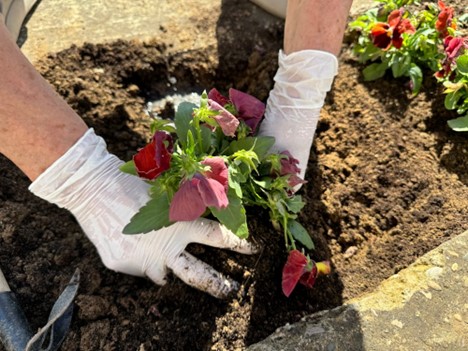Have you ever wondered how to give your plants health without relying on harsh chemicals? The answer lies in the magic of natural fertilizers.
A thriving garden starts with healthy soil and well-nourished plants. Natural fertilizers are essential for your garden to thrive and are a safer, more sustainable alternative to synthetic fertilizers. By choosing natural fertilizers, you not only promote healthy plant growth, but also contribute to a healthier ecosystem.
Let’s take a deep dive into the wonderful world of natural fertilizers and explore how it can take your gardening game to the next level.
The magic of natural fertilizer
Natural fertilizers, unlike synthetic fertilizers, are derived from organic materials. They work by nourishing the soil itself and promoting the growth of beneficial microorganisms that break down organic matter and release nutrients to plants.
This creates a healthy cycle that nourishes your plants while improving soil fertility in the long run. Natural fertilizers are environmentally friendly and safe for pets and children who play around your garden flower beds.
The main advantages of using natural fertilizers are:
Enhances soil health: Natural fertilizers promote the thriving of soil microbial communities and contribute to healthy soil structure and drainage.
Continuous Nutrient Release: Unlike synthetic fertilizers that can provide nutrients quickly, natural fertilizers provide a slow and steady release, ensuring a balanced supply of nutrients to your plants throughout the growing season.
Environmentally friendly: Natural fertilizers are derived from renewable resources and do not leach harmful chemicals into soil or waterways.
SAFE FOR PETS AND KIDS: With natural fertilizers, you can rest assured that your furry friends and little ones will be safe playing in your garden.
Edible Garden: Natural fertilizers are perfect for nourishing your vegetable garden, herb garden, or any space where you grow food. You can have peace of mind knowing that your homemade produce is free of harmful residues.
Examples of natural fertilizers that power up plants
A treasure trove of natural fertilizers is waiting to be discovered. Let’s consider some options that are readily available.
compost
Compost, the king of natural fertilizers, is made by decomposing organic materials such as food scraps, garden waste, and fallen leaves.
fertilizer
A great source of nutrients, manure comes in many forms, including cow, chicken, and horse manure. Each has its own nutrient profile, so be sure to research which type is best for your plants.
worm casting
Filled with beneficial microorganisms and nutrients, the worm castings are the fuel for plant growth.
coffee grounds
Do not throw away used coffee grounds. They are an excellent source of nitrogen and are perfect for acid-loving plants like the precious African lily.
egg shell
Eggshells are a great source of calcium, which strengthens cell walls and promotes healthy growth in fruits and vegetables.
Choose the right natural fertilizer for your plants’ needs
Just like us, plants have different nutritional requirements. Some may need more nitrogen to grow lush foliage, while others may need increased phosphorus to produce bright flowers. Here’s a quick guide to choosing the right natural fertilizer based on your plants’ needs.
For leaf growth: Compost and manure are excellent sources of nitrogen, which is essential to promoting healthy green growth.
Root development and flowering: Bone meal contains sufficient amount of phosphorus, which helps in root development and flower production.
For fruiting and flower growth: Banana peel and wood ash are rich in potassium, an important nutrient for promoting fruiting and flower production.
Use natural fertilizers effectively
Now that you have an arsenal of natural fertilizers, let’s get to work. Here are some tips for using them effectively.
composting
As mentioned earlier, composting is a great way to create nutrient-rich fertilizer for your garden. Read the top 5 composting methods to reduce waste.
Use of other natural fertilizers
If you use commercially available options or fertilizers, follow the directions on the package.
timing and frequency
Generally, it is best to fertilize during the plant’s active growth period. Application frequency varies depending on the fertilizer used, so be sure to refer to the product recommendations. Generally, the best time to fertilize your lawn to encourage root growth is early spring. It can also be done in the fall to help your lawn recover from summer stress and prepare for winter. Depending on the type of grass and climate, spraying in midsummer is effective, but to prevent burns, avoid spraying in hot and dry conditions.
Long-term strategy for healthy soils
Natural fertilizers are a great way to energize your plants, but building a strong foundation is important to building a healthy and thriving garden. Here are some long-term strategies to consider:
Mulching: Mulch acts like a protective blanket over the soil, retaining moisture, suppressing weeds, and adding nutrients as it slowly decomposes over time. Cover crops: Planting cover crops in the off-season helps prevent erosion, add organic matter to the soil, and fix nitrogen from the air. Crop rotation: Rotating crops in a particular bed helps prevent nutrient depletion and prevents soil-borne diseases.
By employing natural fertilizers and incorporating these long-term strategies, you can foster a thriving garden ecosystem that produces healthy, vibrant plants.
Are you ready to grow a thriving garden while naturally enhancing plant health? Garden Savvy provides all the tools and resources you need to start growing your plants and keep them growing. Browse our large selection of suppliers, plan and build your garden with our online garden planner, get instant expert advice from GardenAI, and watch your green thumb grow.





